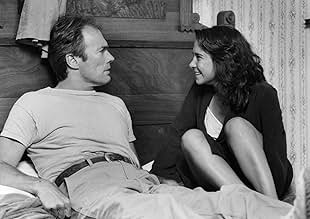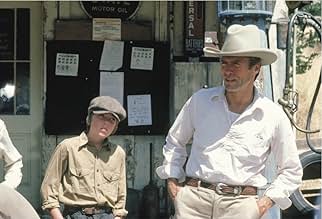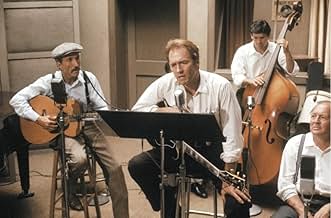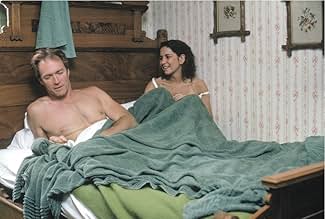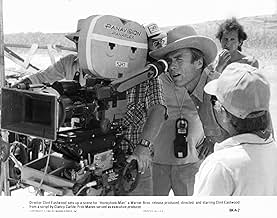CALIFICACIÓN DE IMDb
6.6/10
9.7 k
TU CALIFICACIÓN
Agrega una trama en tu idiomaA boy with a music talent goes on a journey with his uncle for a stage concert.A boy with a music talent goes on a journey with his uncle for a stage concert.A boy with a music talent goes on a journey with his uncle for a stage concert.
- Premios
- 1 nominación en total
Argumento
¿Sabías que…?
- TriviaThe script originally called for Whit (Kyle Eastwood) to get high from smoking marijuana, but Clint Eastwood, who is very anti-drug, refused, even with Kyle using a prop cigarette. Eastwood finally relented to his son's character getting high from a contact buzz.
- ErroresRyman Auditorium is used as the setting for the Opry. This venue was not used until the 1940s, and the movie takes place in the 1930s.
- Citas
Highway Patrolman: [finds Marlene in the trunk of the car] Get out of there! It's against the law to ride in the trunk in this state. I don't suppose you've got any I.D., either?
Marlene: Idee? Idee 'bout what?
- Versiones alternativasABC edited 7 minutes from this film for its 1986 network television premiere.
- ConexionesFeatured in At the Movies: Dueling Critics (1983)
- Bandas sonorasHonkytonk Man
Sung by Marty Robbins and Clint Eastwood
Opinión destacada
A little farm somewhere in Oklahoma that can be mistaken for a Western homestead. But then a red convertible comes toward as uninvited a guest as the dust storm. Then from the worn-out overalls and the whole sandy texture, we can tell this is the Great Depression. So just before the story starts, a series of vignettes popped in my mind: families, nostalgia, America, country music, blues, road movies...I knew what to expect.
The car stops before it hurts someone (except for the driver and an ill-placed windmill), the driver isn't dead but "dead drunk", it's the family's uncle from Mama's side. He doesn't know it yet but the life of fourteen-year old Whit (Kyle Eastwood) is taking a new turn very soon. That boy spent his life staring at the emptiness of the Oklahoman plains while sitting on the house steps, so he welcomes the visitor as good news and what is hidden in the car's trunk is more than promising: it's a guitar, smooth and shiny.
As Red Stovall, Clint Eastwood makes an interesting variation on the 'cool uncle' figure, the one who travels a lot, tells interesting stories and always bring items that cut through the daily banality. Eastwood doesn't even make him unlikable, just a bit gruff, but this is a man who likes music and can only appreciate that a kid likes it. Whit's father (Matt Clark) is a frustrated farmer with the look of someone who kept eating the sour grapes of wrath, Red can see that this is no inspiring figure for a kid at the verge of adulthood while Whit admires his detachment and his badass stetson. The bond is tacit but immediate, Whit cleans his uncle's car so good one could see his face there, he makes it ready for a new start as if he felt he would be part of it.
Road movies and Great Depressions form an inevitable narrative pairing, that was the time of John Steinbeck and famers emigrating, the time Bonnie and Clyde filled the headlines while emptying small town banks, the time artists translated their ordeals into songs that built up to country music, and that's Red's dream: a stage concert in the Grand Ole Opry in Nashville. The mother (Verma Bloom) is worried about her brother's suspect coughs and accepts to have his son following him. The third passenger is Grandpa (John McIntre) who wants to go back to Tennessee, being the one instance of a man moving toward a brighter death.
As usual, Eastwood plays a man with a secret past, once we suspect triggered his alcoholism and choice for celibacy, a broken romance, a bad choice, a fear of success, who knows? There's obviously something buried in that soul that the gentle poetry of country music can dig out one shovelful at once. Like I said in many reviews, country music is all about telling stories. The film's gone for one hour when Red unveils his secrets and once they come, we're not even surprised for they were already hinted in the songs he played in shabby motels, musical clubs and honkytonks. The songs told his story allowing the rest to be totally devoted to a tender picturesque uncle-and-nephew journey.
And so we see them traveling, making halts in colorful little towns, fixing their cars and visiting whorehouses to pursue the initiation of little Whit, he breaks a promise by drinking some bootleg whisky, he has his first dizzying inhalations but nevertheless remains a good kid, being as essential a driver and assistant to Red as Red is a mentor. What they have in common than is that they're aware of their limitations but are willing to take chances, still better than working in a plantation. They're right on the long term because country music doesn't nourish people as folks do but we do remember folks through country music. The audition is Red's ticket for immortality.
Now, "The Honkytonk Man" is one of these low-key Eastwood movies that only invite you to take each moment as it comes and see where it's leading up to. You have a few chuckles when they steal hens and get arrested, you're in awe of the grandpa recalling his memories of the Oklahoma rush, September 16 1893 I remember it, and you just enjoy the music. And what do you know, at the end you realize that you've enjoyed a little gem, it had a story, it had character development and once again with Clint Eastwood, even the 'minor' offerings have major things to say. This time, it's about the roots of America, the art form it originated without any European inspiration, the best that could come from the most difficult times.
The atmosphere of the era is well-restored, there are some cameos from real artists and overall, the material adapted from Clancy Carlile's novel doesn't go for the big dramatic twist. Just when you expect a deadly confrontation with a shady debtor might end bad, it's played for laughs and introduces a plucky wannabe musician named Marlene (Alexa Kenin) who also wants to make it big in Nashville, she's not a love interest, not a sidekick, but just a girl eager to get one chance to change her life, she's as willing as the others. I was really impressed by her comedic potential, making Kyle Eastwood a little bland in comparison. It's quite sad the actress passed away shortly after the film.
I don't use "low-key" as a synonym of "unpretentious", Clint Eastwood is a child of the Great Depression, if he wasn't exactly from a poverty-stricken family, he grew up with the spectacle of Okies coming to pick oranges or cotton in California and listening to radio and country music. I'm no musical expert but I could feel the passion in his songs, and from the simple but poignant way he tells his story, you can tell Eastwood had it in him. How ironic that one of his lesser known film might be his most personal.
The car stops before it hurts someone (except for the driver and an ill-placed windmill), the driver isn't dead but "dead drunk", it's the family's uncle from Mama's side. He doesn't know it yet but the life of fourteen-year old Whit (Kyle Eastwood) is taking a new turn very soon. That boy spent his life staring at the emptiness of the Oklahoman plains while sitting on the house steps, so he welcomes the visitor as good news and what is hidden in the car's trunk is more than promising: it's a guitar, smooth and shiny.
As Red Stovall, Clint Eastwood makes an interesting variation on the 'cool uncle' figure, the one who travels a lot, tells interesting stories and always bring items that cut through the daily banality. Eastwood doesn't even make him unlikable, just a bit gruff, but this is a man who likes music and can only appreciate that a kid likes it. Whit's father (Matt Clark) is a frustrated farmer with the look of someone who kept eating the sour grapes of wrath, Red can see that this is no inspiring figure for a kid at the verge of adulthood while Whit admires his detachment and his badass stetson. The bond is tacit but immediate, Whit cleans his uncle's car so good one could see his face there, he makes it ready for a new start as if he felt he would be part of it.
Road movies and Great Depressions form an inevitable narrative pairing, that was the time of John Steinbeck and famers emigrating, the time Bonnie and Clyde filled the headlines while emptying small town banks, the time artists translated their ordeals into songs that built up to country music, and that's Red's dream: a stage concert in the Grand Ole Opry in Nashville. The mother (Verma Bloom) is worried about her brother's suspect coughs and accepts to have his son following him. The third passenger is Grandpa (John McIntre) who wants to go back to Tennessee, being the one instance of a man moving toward a brighter death.
As usual, Eastwood plays a man with a secret past, once we suspect triggered his alcoholism and choice for celibacy, a broken romance, a bad choice, a fear of success, who knows? There's obviously something buried in that soul that the gentle poetry of country music can dig out one shovelful at once. Like I said in many reviews, country music is all about telling stories. The film's gone for one hour when Red unveils his secrets and once they come, we're not even surprised for they were already hinted in the songs he played in shabby motels, musical clubs and honkytonks. The songs told his story allowing the rest to be totally devoted to a tender picturesque uncle-and-nephew journey.
And so we see them traveling, making halts in colorful little towns, fixing their cars and visiting whorehouses to pursue the initiation of little Whit, he breaks a promise by drinking some bootleg whisky, he has his first dizzying inhalations but nevertheless remains a good kid, being as essential a driver and assistant to Red as Red is a mentor. What they have in common than is that they're aware of their limitations but are willing to take chances, still better than working in a plantation. They're right on the long term because country music doesn't nourish people as folks do but we do remember folks through country music. The audition is Red's ticket for immortality.
Now, "The Honkytonk Man" is one of these low-key Eastwood movies that only invite you to take each moment as it comes and see where it's leading up to. You have a few chuckles when they steal hens and get arrested, you're in awe of the grandpa recalling his memories of the Oklahoma rush, September 16 1893 I remember it, and you just enjoy the music. And what do you know, at the end you realize that you've enjoyed a little gem, it had a story, it had character development and once again with Clint Eastwood, even the 'minor' offerings have major things to say. This time, it's about the roots of America, the art form it originated without any European inspiration, the best that could come from the most difficult times.
The atmosphere of the era is well-restored, there are some cameos from real artists and overall, the material adapted from Clancy Carlile's novel doesn't go for the big dramatic twist. Just when you expect a deadly confrontation with a shady debtor might end bad, it's played for laughs and introduces a plucky wannabe musician named Marlene (Alexa Kenin) who also wants to make it big in Nashville, she's not a love interest, not a sidekick, but just a girl eager to get one chance to change her life, she's as willing as the others. I was really impressed by her comedic potential, making Kyle Eastwood a little bland in comparison. It's quite sad the actress passed away shortly after the film.
I don't use "low-key" as a synonym of "unpretentious", Clint Eastwood is a child of the Great Depression, if he wasn't exactly from a poverty-stricken family, he grew up with the spectacle of Okies coming to pick oranges or cotton in California and listening to radio and country music. I'm no musical expert but I could feel the passion in his songs, and from the simple but poignant way he tells his story, you can tell Eastwood had it in him. How ironic that one of his lesser known film might be his most personal.
- ElMaruecan82
- 30 mar 2021
- Enlace permanente
Selecciones populares
Inicia sesión para calificar y agrega a la lista de videos para obtener recomendaciones personalizadas
- How long is Honkytonk Man?Con tecnología de Alexa
Detalles
- Fecha de lanzamiento
- País de origen
- Idioma
- También se conoce como
- El aventurero de medianoche
- Locaciones de filmación
- Fallon, Nevada, Estados Unidos(scene with bull)
- Productora
- Ver más créditos de la compañía en IMDbPro
Taquilla
- Presupuesto
- USD 2,000,000 (estimado)
- Total en EE. UU. y Canadá
- USD 4,484,991
- Fin de semana de estreno en EE. UU. y Canadá
- USD 667,727
- 19 dic 1982
- Total a nivel mundial
- USD 4,484,991
Contribuir a esta página
Sugiere una edición o agrega el contenido que falta

Principales brechas de datos
What is the Mexican Spanish language plot outline for Honkytonk Man (1982)?
Responda

